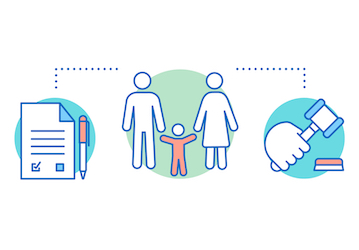Parenting is hard enough when you and your child’s other parent are together. But when you divorce or separate, it can be really difficult to share parenting duties with a united front. In a healthy “co-parenting” relationship, parents who are no longer together respect each other, talk regularly, and put their child’s needs first. But when you can’t cooperate or communicate after a messy split, it can be especially tough for you and your kids.
Sometimes there are more serious reasons why co-parenting won’t work, such as violence, neglect, or the misuse of drugs or alcohol by a parent. No matter what, it’s crucial that your kids are safe and don’t feel “in the middle” of your parenting conflict.
Alternatives to co-parenting
The good news is that there are other ways to ensure you stay actively involved in raising your child, even if the relationship with your ex doesn’t allow for true co-parenting. (However, if you’re not sure it’s healthy for your kids to have a relationship with a parent who has shown questionable behavior, talk to a professional such as a therapist or your doctor before moving forward.) Consider these alternatives to co-parenting to give your kids the support they need.
Try “parallel parenting.” This strategy is one of the most common arrangements after a divorce. The goal of parallel parenting is to minimize engagement with one another, and thus conflict, by having each parent function independently according to a very detailed plan. You might create the plan together, or with the help of a professional such as a therapist, chaplain, or mediator. When cooperation isn’t possible, both parents stick to the plan, which helps to decrease the potential for conflict.
Use a parenting coordinator. In some cases, coming up with a parenting plan isn’t enough. In these situations, a “parenting coordinator” might be helpful. Often appointed by a court (and accountable to it), a parenting coordinator bridges the gap between parents who are better off not communicating—but still need to. The coordinator helps with communication about scheduling, updates about the kids, and other information that parents might need to share. Parenting coordinators can help you both learn communication skills, find access to parenting education, and work through issues outside the court system too. They also can save you money and stress (and possibly put you on a path to collaborative co-parenting).
Be actively engaged. If you continue struggling to communicate and coordinate with your ex, try some of the following tips to stay involved with your kids:
- Try to maintain scheduled check-ins with your children, even when they’re with their other parent. Touch base via phone, video chat, text, or email.
- Talk to your boss about adjusting your schedule to make visits easier and more frequent, especially if you need to travel to see your kids.
- When you communicate with your ex about schedules and other topics, make sure it’s “in writing” (text or email) to avoid confusion.
- Get creative about connecting with your kids when you’re apart. Read the same books they’re reading, or watch the same movies or TV shows, so you have common things to talk about.
- Make it clear to your ex, schools, and healthcare providers that you must be included in discussions and decisions about your child’s education and medical care. Also, make sure you receive school and community newsletters, activity calendars, and sports schedules.
- Set healthy boundaries, so all family members agree to treat each other respectfully.
